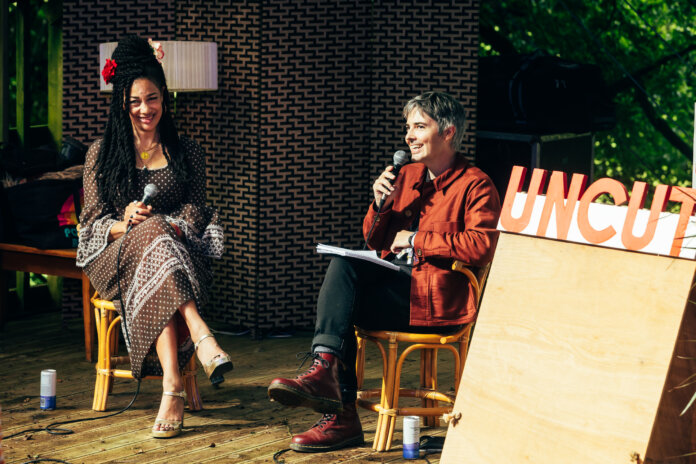Fingers gently sweeping an autoharp, on the Talking Heads stage Angeline Morrison sings her haunting untold stories. “Mad-Haired Moll O’Bedlam”, sentenced to the sanitorium for raising her voice at a policeman. The victims of the port town race riots in the wake of WWI. The plantation slaves l...
Fingers gently sweeping an autoharp, on the Talking Heads stage Angeline Morrison sings her haunting untold stories. “Mad-Haired Moll O’Bedlam”, sentenced to the sanitorium for raising her voice at a policeman. The victims of the port town race riots in the wake of WWI. The plantation slaves lured to England by the promise of money, land and the African queen they were told ruled the country.
All tracks are from her recent album The Sorrow Songs: Folk Songs Of Black British Experience, which formed the basis of the first of the weekend’s Uncut Q&A sessions on the same stage just an hour earlier. “It’s a re-storying of Britain’s lost and forgotten black ancestors, who have been here for over 2,000 years, since Roman times at least, but who seem to be missing from the folk and traditional songs of these islands,” she told host Tom Pinnock.
Morrison’s immersive journey and research into their stories made for a fascinating, eye-opening and often moving discussion. Talk began on the track “Unknown African Boy (D. 1830)” which Morrison recently performed solo on Later… With Jools Holland, about “a child whose estimated age was around eight years of age who was washed ashore when a slave ship was wrecked off the Isles of Scilly.”
“I went to the grave,” Morrison said, “it was so emotional. The story really broke my heart – he was a child and he should have been having fun and playing with his friends and instead was abducted and trafficked halfway across the world destined for a life of torture and an early death by drowning. I wanted to honour that. When it’s a child involved it highlights the bigger picture.”
Discussion moved on to “The Beautiful Spotted Black Boy”, based on the early 19th Century story of George Alexander Gratton, trafficked form St Vincent’s by circus entrepreneur John Richardson at the age of four or five because his vitiligo would have made him a popular exhibit in European freak shows as one of what were called “the spotted children”. “He was bought for a thousand guineas and exhibited around the country,” Morrison explained, “and John Richardson was said to have absolutely adored this boy and loved him as his own child.” When he died, she said, Richardson bankrupted himself building a brick mausoleum to protect the child’s valuable body. “He’s said to have died from a broken heart shortly afterwards and is buried with the child. It’s abhorrent, with notes of ‘ooh’.”
That these stories had been “airbrushed out” of Britain’s folk traditions, Morrison argued, reflected the invisible nature of so many black Britons throughout history. “So many of these black ancestors weren’t officially recorded,” she said. “Unless you had a birth certificate, marriage certificate, death certificate or an official burial in a church, you weren’t recorded. So there’s going to be more than we’re able to count.”
Her next album, she revealed, would be about the art of alchemy: “each song will be a meditation on one of the alchemical stages”. Has she mastered the power of alchemy, Pinnock asked? “It’s a little early to say,” she chuckled. “I’m getting there.”



